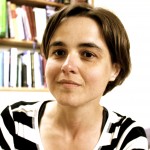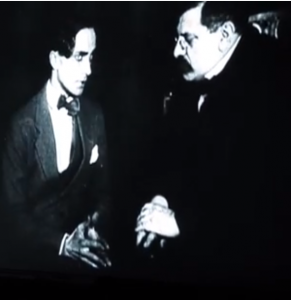 This post was contributed by Dr Heike Bauer, Senior Lecturer in English and Gender Studies in the Department of English and Humanities. Her project, Magnus Hirschfeld and the Shaping of Queer Modernity, is funded by an AHRC Fellowship. Follow her on Twitter.
This post was contributed by Dr Heike Bauer, Senior Lecturer in English and Gender Studies in the Department of English and Humanities. Her project, Magnus Hirschfeld and the Shaping of Queer Modernity, is funded by an AHRC Fellowship. Follow her on Twitter.
My project began with a curious textual encounter. There is a ‘conspiration of silence’ about homosexual persecution I read in one the earliest studies of male and female homosexuality, Die Homosexualität des Mannes und des Weibes (1914). At over a thousand pages in length, the book by the Jewish doctor and sexual reformer Magnus Hirschfeld (1868-1935) is arguably the most substantial modern work on the topic. Like most of Hirschfeld’s publications, it is written in German, but nevertheless contains many English phrases. As someone who – like Hirschfeld’s readership in the early twentieth-century – moves freely between German and English, I had not paid much attention to his occasional switches between languages. Yet the encounter with Hirschfeld’s mistranslation of ‘conspiracy’ made me pause and wonder about the role of translation in his work. Why did Hirschfeld turn to English in his accounts of the lives of women and men whose same-sex desires rendered them ‘anders als die andern’: different from the others?
Photo: Heike Bauer
Hirschfeld, a trained doctor who had also studied literature and languages at several European universities, is one of the most prolific and influential modern sexologists. He is best known today for his homosexual rights activism, foundational studies of transvestism and opening of the world’s first Institute of Sexual Sciences in Berlin in 1919. A well-known figure amongst contemporary writers and artists, his work was international in scope and outlook. He travelled extensively between the 1890s and 1920s, gathering information about the lives of queer women and men from around the world and forging friendships with colleagues in Europe, the U.S., Asia and the Middle East. My interest in Hirschfeld initially focused on the international dimension of his work, for his many connections provide compelling new insights into the global networks of exchange that shaped debates about sexuality across the modern world (I explored these international links in a Wellcome Trust funded project on Sexology and Translation: Scientific and Cultural Encounters in the Modern World, 1860-1930)
Hirschfeld’s reference to the ‘conspiration of silence’ that smothers debates about the persecution of homosexuality shifted my research into a new direction. It made me realize that there is a gap in scholarship on the modern history of sexuality: for while we know of many queer lives which have ended tragically as a result of legal persecution, violent attack or the inability to cope with heteronormative social and emotional pressures, we know surprisingly little about the traumatic impact of this suffering on the lives of their contemporaries, and on the shaping of modern queer culture more broadly.
As someone trained in literary studies, my research is built around close readings of texts and their contexts. Paying attention to where English phrases appear in the German narrative – ‘conspiration of silence’ is just one of many such examples (although most of them are in flawless English ) – opened my eyes to an archive of little known accounts of lesbian and homosexual injury, persecution and suicide, and it pointed me to evidence of how this suffering was received by the women and men who identified in some form with the victims.
I found that next to his well-known theorizations of what he called ‘the third sex’, Hirschfeld was also a chronicler of the effects of hate and violence against lesbians and homosexual men and other groups of people. Publishing both in German and English and influenced by his literary as well as medical training, he wrote, for example, about the death of Oscar Wilde and how it affected homosexual men at the turn of the last century; he conducted the first statistical surveys of lesbian and homosexual suicide; and he published books on war, nationalism and racism in which he collated evidence of different forms of collective discrimination and their impact on individual lives.

Conrad Veidt and Magnus Hirschfeld in Anders als die Andern (dir. Richard Oswald, 1919), a film about homosexual blackmail featuring Hirschfeld. It ends with the tragic suicide of the blackmail victim. Screenshot.
A Violent World of Difference examines these writings and Hirschfeld’s own suffering and its reception– he was both verbally and physically attacked and his Institute was destroyed in a Nazi raid in 1933 – for the insights it provides into the role of violence in the shaping of modern queer culture. The project discusses sexological literature, literary and popular culture, film and photography to demonstrate that traumatic experiences had a significant impact not only on the individuals subjected to them but also on the shaping of a collective identity.
By paying attention to how queer suffering was understood and received in the U.K, Germany and the U.S., the project further traces the transnational contours of modern queer culture to reveal that violent attacks on lesbians and homosexual men created emotional shockwaves that rippled far across the geopolitical boundaries of the modern world.
As part of the project, I will be leading a series of workshops and symposia on homophobia and literature, queer suicide, and on working with feelings in the history of sexuality. Please contact me if you would like to hear more about this work: h.bauer@bbk.ac.uk

Dr Bauer,
First, my congratulations! Your contribution to this research will be invaluable, no doubts.
It is a subject which has always interested me very much, and in which I hope to also do some research myself in the future; Spain will be the country in which I would like to concentrate, as long ago (1953) an incident happened there (never made public), which has remained in my mind ever since.
Good luck with your work.
Sol